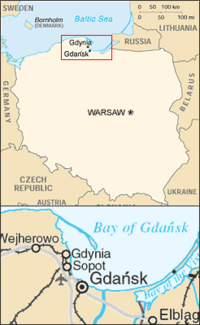This article needs additional citations for verification. (February 2016) |
| Operation Worek | |||||||
|---|---|---|---|---|---|---|---|
| Part of Invasion of Poland | |||||||
 Polish submarines sectors as in the Worek Plan. Legend: | - battery charging site || - sector of operation | |||||||
| |||||||
| Belligerents | |||||||
|
|
| ||||||
| Commanders and leaders | |||||||
|
|
| ||||||
| Strength | |||||||
| 5 submarines |
2 pre-dreadnoughts 3 light cruisers 9 destroyers 1 torpedo boat 8 minesweepers 8 E-boats 4 escorts 10 submarines | ||||||
| Casualties and losses | |||||||
|
3 submarines damaged 4 submarines interned (including damaged)[Note 1] |
24 killed 1 minesweeper sunk | ||||||

The Worek Plan (or Operation Worek, Polish: Plan Worek, literally Plan Sack) was an operation of the Polish Navy in the first days of World War II, in which its five submarines formed a screen in order to prevent German naval forces from carrying out landings on the Polish coast, and to attack enemy ships bombarding Polish coastal fortifications, in particular the base on the Hel Peninsula.
The operation came to naught, as the Germans did not have any plans for naval landings. It caused the submarines to operate in a confined area near the shore in shallow waters, making them vulnerable to strong enemy anti-submarine forces. As a result, despite making a number of attempts, the submarines were unable to directly sink any enemy ships during the operation, although a mine placed by the Żbik did sink a German minesweeper. No Polish submarines were lost to enemy action, but they suffered progressive wear and tear, and technical problems, forcing the submarine commanders to break off their actions, effectively ending the operation by the middle of September 1939.
Cite error: There are <ref group=Note> tags on this page, but the references will not show without a {{reflist|group=Note}} template (see the help page).